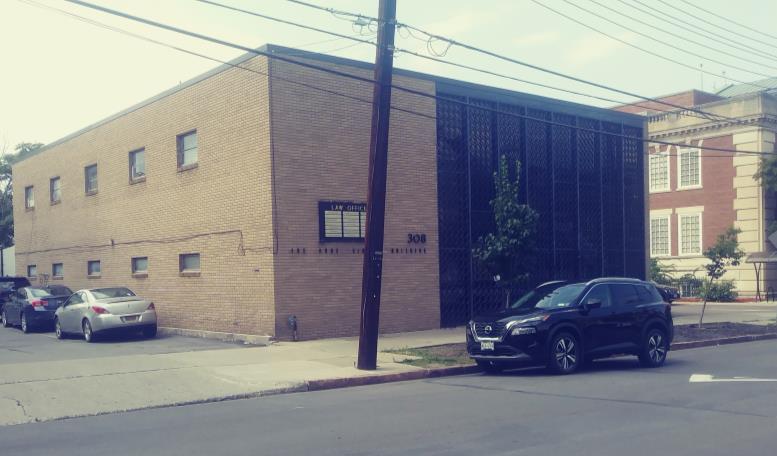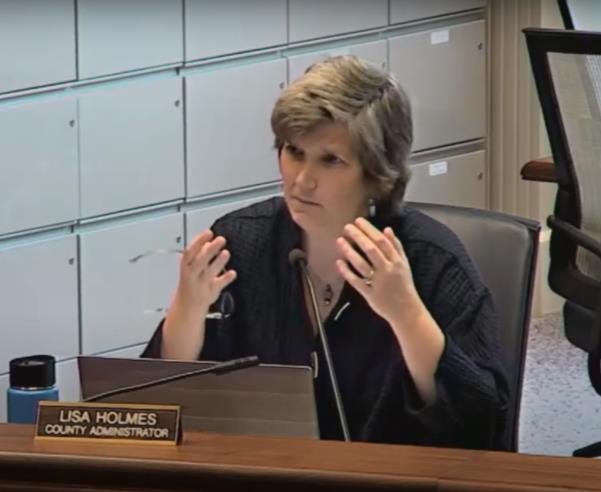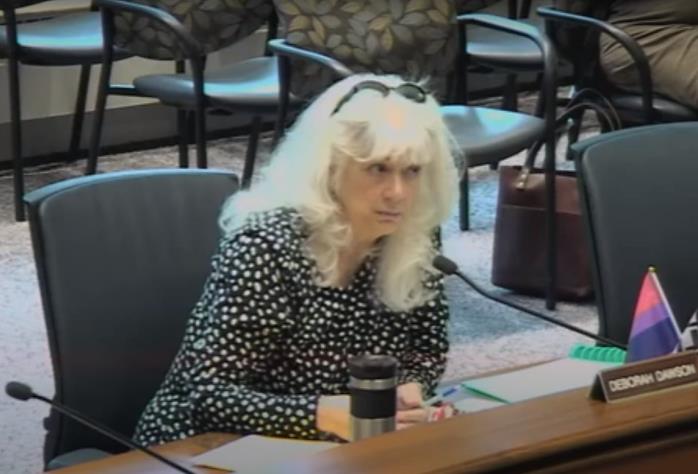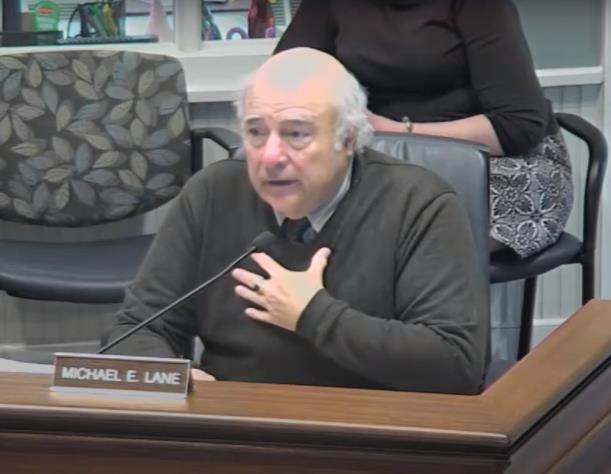County in a Demo Bind over Center of Government
By Robert Lynch, April 23, 2023
Quite frankly, this was Jason Molino’s baby. But now Molino is gone, and the baby is bawling.
Months before the pandemic, Molino, the former Tompkins County Administrator, caught wind of two prime commercial lots up for sale adjacent to the Courthouse. And even though the County Legislature had months earlier laid down $1.8 Million for a plot of partially-vacant land a block away and tapped it as its intended site for a new multi-story Center of Government, Molino thought this new land looked better, a whole lot better.

For nearly two years, while most of us had COVID-19 on our minds, Molino worked in the shadows. He prodded the County Legislature and its key Downtown Facilities Committee to launch protracted—often tortured—negotiations to purchase both the Key Bank Building on the corner of East Buffalo and North Tioga Streets, and the “Professional Building,” the former Wiggins Law Offices, next to it. All the meetings were secret. I tried to squeeze those in the know to tell me what they knew. They wouldn’t. To whatever was happening behind those locked legislative doors, the public remained blind and deaf to it.
The story finally broke in August 2021, three months after Molino left for another job. It broke only because it had to. Tompkins County was buying the Key Bank Building for $1.7 Million and the Wiggins’ offices for $1.1 Million. The existing buildings would come down. The combined lots would become the new, preferred footprint for a county office building, the Center of Government. Jason Molino’s wish would be fulfilled. The deal closed months later. Earlier this month, Molino’s successor, current County Administrator Lisa Holmes, presented legislators a detailed PowerPoint of where things had been and where they might be headed. She offered little more than the wise among us already knew.
That was then. But now there’s a problem. It came to light when County Administration took its next logical step and drafted a resolution to deconstruct the old Wiggins’ offices as soon as current tenant leases expire next February. The problem is that the City of Ithaca may not let them do it.
“We are essentially saying we are going to deconstruct a building without a plan to construct a Center of Government in its place,” Holmes told the County Legislature’s Facilities and Infrastructure Committee last Thursday. “And that is a little different than where we started, and it runs us afoul of the city’s land use policies.”

The legislative committee took no action on the deconstruction resolution Thursday. Instead, after 45 minutes’ discussion over whether to move forward with the wrecking ball—possibly pre-empting City law—or instead rewriting environmental paperwork, the committee set a special meeting for April 25th to weigh its options further.
Relatively modern—built sometime in the late 1960’s—and not considered a “contributing structure” of any architectural significance, the stylishly-unique law office building lies within the DeWitt Park Historic District. That locational status gives Ithaca Building Department officials heightened scrutiny over what kind of structure would take its place before an owner could do anything to take the Wiggins building down.
Resolutions passed when Tompkins County bought the twin structures two years ago made clear the County’s intent to replace them with a Center of Government. But structural designs have never advanced beyond conceptual sketches. Nothing’s been said about how big or high the building might be or how ugly it might look. Nor, for that matter, has the Legislature passed a firm commitment to build the building at all. And Thursday’s discussion made plain that on that latter point, opinion remains divided.
“I will admit I am probably the least patient person on this Legislature,” Lansing’s Deborah Dawson conceded. “But this has been going on for three years. We need to fish or cut bait.”

Properties get purchased. Environmental assessments get drafted. Capital plans get written, Dawson noted. And in her opinion, when they were performed, “we made a series of commitments to build a Center of Government.” But yet, Dawson lamented, “every time we try to move this thing forward, someone, somewhere says, ‘Oh, no, no, we didn’t make that commitment; no, we need to take more time and consider it more….’ How many times do we make a decision and a commitment and then we back off and change our minds?”
Committee Chair Mike Lane had a ready reply.
“Deb, I know you’re impatient. You’re also the person who talks very strongly about being careful with our budget. I’m not ready personally to leapfrog into a $20-30 Million project at this point.” (Comments at the April 4th legislative meeting suggested the price tag could climb to $40 Million.)
“We haven’t decided to build that building at all,” Lane insisted. “At least I haven’t voted to spend any money to build it.”
“What more do we really need?” Dryden’s Greg Mezey asked. The Dryden Democrat proved impatient to get the wrecking crews moving. “We’re asking to move forward with the first step in the process,” Mezey reasoned, “Because you can’t have a new building with an old building on the site.”
“Do we need architectural drawings? Do we need to have another resolution? What do we need to have before we show that this is our intention?” Mezey asked.
But City rules are City rules. And County Planning Commissioner Katie Borgella suggested that Ithaca’s reluctance to sign off quickly on demolition stems from a City Hall hesitancy to replace an unwanted building with nothing more than a vacant hole.

“If it’s clear that there’s a Center of Government going to be built on that corner, then… I think you could probably move forward with demolition of the buildings on the site because of a higher government purpose,” Borgella told the committee. However, she cautioned, “They do have ordinances that you can’t demolish a building in the City of Ithaca without going through site plan review.”
“If you don’t have a clear County purpose of serving something, then you need to conform with (the City of Ithaca’s) land use rule, and that would require going through the whole demolition process that they have in place,” Borgella said.
Those with long memories will recall Ithaca’s misbegotten experience with Urban Renewal in the 1960’s and 70’s and should understand contemporary reasoning. Quick federal cash then led to the hasty razing of vast swaths of downtown, including landmarks like the old Ithaca Hotel and the former Ithaca City Hall. It left only blocks as vacant dust bowls, unreconstructed for years.
“The problem with the law building,” Borgella told the committee, is that you’re “taking something down with no clear plan for what you’re going to do with it.”
“And that’s the whole point of the City’s ordinances that they have in place,” the planner added. “They don’t want people speculating and just clearing off properties in the hopes that someone develops it in the future.”
“Yea, but we’re not just people, we’re the County,” Lane replied.

“What’s the test? Who’s the adjudicator?” Mezey asked in desperation.
Ultimately, that “adjudicator” could, in fact, be a judge. State law provides counties limited authority to overrule municipal land use restrictions, clout that Tompkins County could exercise at the price of poisoning relations with those in Ithaca’s government. Some at Thursday’s meeting suggested that an attorney specializing in land use law be brought into the conversation.
“All I’m looking for on this building is for us to dot our i’s and cross out t’s to whatever entity may put up a barrier to slowing this thing down.” Enfield-Newfield legislator Randy Brown,” told the committee on which he sits.
But in pointing out the false starts and mixed messages the Legislature has given over the years, Brown acknowledged, “The County’s purchased other buildings and it didn’t work out.”
And again, those sudden, seemingly spontaneous swings in Center of Government site-shopping sentiment can confuse those who review the environmental documents that may decide the “Professional Building’s” immediate fate, documents that’ll likely require a rewrite before the demolition resolution tabled by the committee Thursday ever comes up for a vote. Lane reminded members that both the former- and presently-preferred development sites were at separate times listed as a Center of Government’s prospective home. In neither instance, however, has the Legislature ever put up the money to match some politicians’ mouths.
And unlike some on the Facilities Committee, Randy Brown has yet to relegate the old Wiggins offices to the wrecking crane. He called Thursday for a professional evaluation be conducted first into the building’s potential reuse.
“It costs energy to knock a building down. It costs energy to put a new building up,” Brown said. “So I’d like to know if that’s a structurally sound building. That would help me.”
And Randy Brown also proffered the most novel idea of the morning. What about scattering space-hungry County administrative offices around, quartering them in easily-accessible rural schools, instead of concentrating them in a pricey downtown high-rise?
“There are buildings all over the county,” Brown claimed. “Every school has thousands of square feet of empty space where we could… reimagine how we provide services to our constituents and put them in the schools so they’re there working with the people.”

Brown said such a plan would save commutes to Ithaca, thus advancing the “Green New Deal.” And it would bring governmental services closer to the people. “I think this is a visionary thing,” Randy Brown proclaimed. “And building a building downtown doesn’t make sense to me right now,” he added.
Something tells this writer that Jason Molino would view Randy Brown’s idea as simply a vision step too far. Leaders like to build monuments to themselves. A side office in Enfield Elementary or in Newfield Central might win a national award, but it doesn’t cut it for most in the political class. Nonetheless, the prospect of a $30 Million—maybe $40 Million—downtown office building is giving some in Tompkins’ legislative chambers the jitters.
It’s not Jason Molino’s 2019 anymore. Babies do grow up.
###

